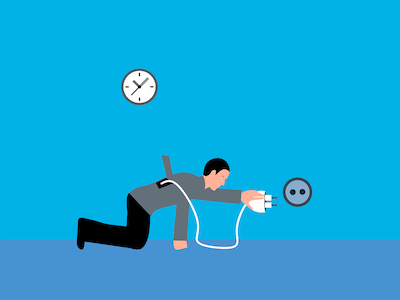Complacency kills your business
By Troy Harrison
Recently, I was talking to a business owner about prospecting and selling new accounts when the business owner asked me an interesting question: "When should I stop worrying about selling new accounts?" My response is always the same: "You should never stop selling new business!" It's been said that pride goeth before a fall. That's probably true, but in business, complacency goeth before total collapse.
 I once worked (for a short time) for a company that had an astounding growth rate. They went from zero to $35 million in annual revenue in ten years - all on the skill set of some talented salespeople and excellent customer service. When they got to $35 million, they decided that they were going to take a "break" from selling new business. Their logic was that they were making plenty of money, the people were happy, and selling new business placed unnecessary strain on their company's infrastructure. Two short years later, they were doing $17 million in annual revenue, losing big bucks, and panicking about the longevity of the company.
I once worked (for a short time) for a company that had an astounding growth rate. They went from zero to $35 million in annual revenue in ten years - all on the skill set of some talented salespeople and excellent customer service. When they got to $35 million, they decided that they were going to take a "break" from selling new business. Their logic was that they were making plenty of money, the people were happy, and selling new business placed unnecessary strain on their company's infrastructure. Two short years later, they were doing $17 million in annual revenue, losing big bucks, and panicking about the longevity of the company.
What happened to them isn't uncommon. First, one big customer went into bankruptcy and ceased operations. Then, top management at another big customer was swept out, and new management didn't want to use the same vendors as the old. Add in a customer death, and they were down to $23 million in a few months. So, what happened to the rest of their business?
Complacency. When the salespeople were told not to sell new business, a couple of them didn't like it - but most of them did. Remember, everyone at this company was making big bucks, and relieving the salespeople of prospecting responsibility while keeping their compensation high was a dream job for many of them. Not all of the sales staff was financially affected by the collapse in revenues, and those that weren't affected didn't feel any real pressure to build the company back up.
Next, customer service went to hell in a handbasket. The intent of the "no new customers" edict had been to make the customer service and production jobs easier, more pleasant, and more productive. It had the exact opposite effect. The customer service reps, no longer having to deal with the changing needs of a sales force bent on growing the business, got fat and happy (not unlike the salespeople). Attention to detail and follow-up suffered. Production expanded what work they had to fill the time allotted, since there was no pressure to get orders out to impress new customers. The whole thing took on the customer-friendly atmosphere of your average Department of Motor Vehicles office.
In a nutshell, an entire company got lazy. That $35 million looked good, but they didn't count on normal customer attrition. Granted, it's unusual to lose three huge customers within a few months' time, but it's not so unusual that you can think, "It would never happen to me." The salespeople, customer service people, and production people who were only too happy to shift into "maintenance" mode found it tough to shift back into "hit the bricks and sell" mode, and the company struggled mightily with these issues. Ownership didn't help much, either - as the company lost big money, they jetted to vacation homes and bought new Mercedes and Porsches instead of tending to business.
Salespeople aren't immune to this syndrome, either. Salespeople can attain a certain income level and decide that it's "enough" for them to live on. Like the people at the company discussed above, it is tougher to re-start prospecting than it is to never stop. I once interviewed a gentleman for a sales position who had a long background in the industry that I was working in, had worked with many of the same types of clients that I wanted to do business with, and presented himself very well.
The chinks in the armor showed when he told me how he built a $1.5 million per year territory (very impressive in that particular industry and time period) by prospecting and cold calling, and bragged that he had been working with many of his customers for more than ten years. When I asked him how much business he was doing in the present, he replied that he was doing about $350,000 annually. It was elementary to drill down and find out that he had built this great territory, stopped prospecting, lost customers to the usual attrition, and not filled his sales funnel with new prospects and new business. His plan, in fact, was to bring his business (what was left of it) over to my company, and presumably ride it all the way down to zero. Not surprisingly, I didn't hire him, and I don't know if anyone else did.
The lesson here is crystal clear: never stop selling. Complacency is a silent killer in the sales world, sneaking up on even the most successful businesses and individuals. It's easy to fall into the trap of thinking you've "made it" and can coast on your current customer base. But the hard truth is, customers come and go - sometimes in bunches, and often when you least expect it.
Smart sales managers and top salespeople know that the key to long-term success is to keep that sales funnel full. Always be prospecting, always be looking for new opportunities, and always be hungry for growth. It's not just about hitting your numbers today; it's about ensuring you'll still be in the game tomorrow, next year, and a decade from now. Remember, in sales, the moment you stop moving forward is the moment you start sliding backward. Keep selling, keep growing, and never, ever get complacent.
 Troy Harrison is the Sales Navigator and the author of “Sell Like You Mean It” and “The Pocket Sales Manager.” He helps companies navigate the Elements of Sales on their journey to success. He offers a free 45-minute Sales Strategy Review. To schedule, call 913-645-3603 or e-mail Troy@TroyHarrison.com.
Troy Harrison is the Sales Navigator and the author of “Sell Like You Mean It” and “The Pocket Sales Manager.” He helps companies navigate the Elements of Sales on their journey to success. He offers a free 45-minute Sales Strategy Review. To schedule, call 913-645-3603 or e-mail Troy@TroyHarrison.com.












